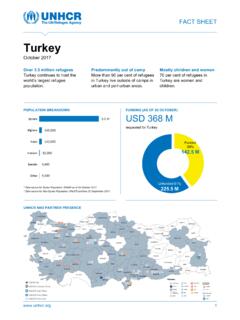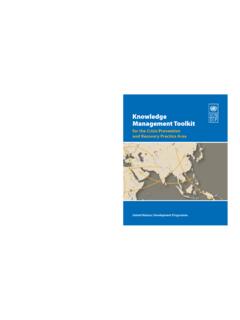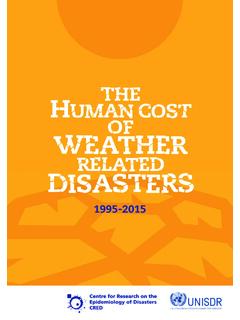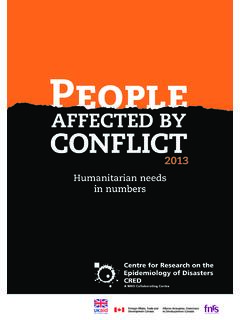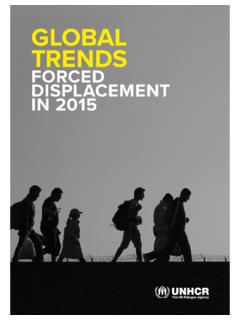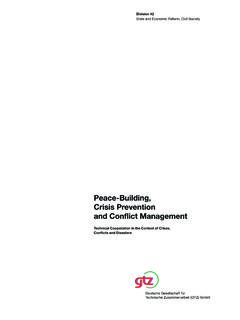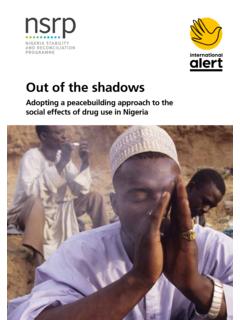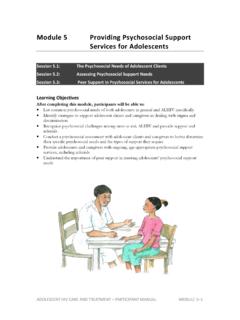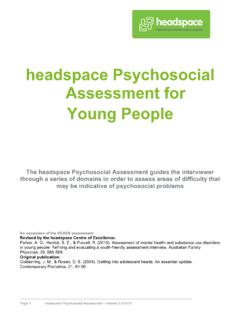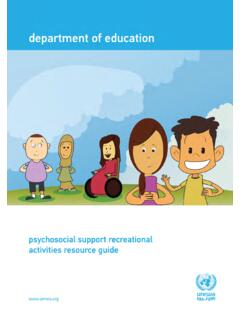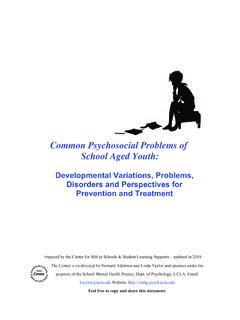Transcription of Guidelines on mental health and psychosocial support
1 Guidelines . ON mental . health AND. psychosocial . support . REFERENCE. Guidelines . ON mental . health AND. psychosocial . support . 2 Guidelines ON mental health AND psychosocial support . CONTENTS. 4. 5. 1. 7. mental health and psychosocial support in armed conflict and other situations of 8. The purpose of this 10. International Red Cross and Red Crescent 10. Overarching principles that guide MHPSS 10. 1. Upholding humanity, impartiality and 11. 2. Ensuring community participation and cultural 3. Complying with medical and health care 4. Delivering quality of care in line with internationally accepted 5. Ensuring a continuum of The ICRC's MHPSS Main Enabling Types of The ICRC'S MHPSS response to Evidence-based monitoring and 16. Programme MHPSS field Time frame for 18.
2 2. FAMILIES OF MISSING 21. Issues of 22. mental health and psychosocial 23. The mental health and psychosocial 25. Needs Programme design and Target Specific Monitoring and Main challenges for programme 35. 3. VICTIMS OF 37. Issues of 38. mental health and psychosocial 40. The mental health and psychosocial 42. Needs Programme design and Target Specific 49. Monitoring and Main challenges for programme 57. Guidelines ON mental health AND psychosocial support 3. 4. 59. Issues of 60. mental health and psychosocial 62. The mental health and psychosocial Needs Programme design and 66. Target 66. Specific Monitoring and Main challenges for programme 5. HOSPITALIZED WEAPON-WOUNDED PATIENTS. AND PEOPLE WITH PHYSICAL 73. Issues of 74. mental health and psychosocial 75.
3 The mental health and psychosocial 76. Needs Programme design and Target Specific Monitoring and 81. Main challenges for programme 83. 6. PEOPLE DEPRIVED OF THEIR LIBERTY AND FORMER 85. Issues of 86. mental health and psychosocial 88. The mental health and psychosocial 89. Needs 90. Programme design and 91. Target 91. Specific Monitoring and 94. Main challenges for programme 97. 7. PEOPLE AFFECTED BY 99. Issues of 100. mental health and psychosocial 101. The mental health and psychosocial 101. Needs Programme design and 103. Target Specific Monitoring and Main challenges for programme 107. 4 Guidelines ON mental health AND psychosocial support . FOREWORD. War and violence destroy communities and countries all over the world, and have a devastating impact on the mental health and psychosocial well-being of millions of people.
4 They lead to the breakdown of local systems and infrastructure. As a result, adequate assistance is often unavailable when people need it the most. People affected by conflict and violence are at risk of death, displacement, loss of loved ones and injury among others and need medical care for both physical and psychological conditions. The International Committee of the Red Cross (ICRC) has developed these Guidelines to outline the organization's approach to mental health and psychosocial support (MHPSS) during and after armed conflict and other situations of violence. These internal Guidelines provide a framework for harmonizing MHPSS programmes within the organization, combining international, evidence-based recommendations and practices with the expertise of the ICRC's field teams.
5 They seek to ensure the quality of the ICRC's interventions in order to effectively alleviate people's distress and improve their cap . acity to function in daily life, support individual and collective coping mechanisms and prevent any additional harm. This publication is a needs-based MHPSS programmatic overview. It describes issues of concern, programme-specific needs assessment methods, the main programme activities and implementation strategies and monitoring and evaluation processes. In sharing these Guidelines with an external audience, the ICRC aims to raise awareness of its approach among professionals and other interested parties and to promote coherent professional and operational programme standards by providing an insight into its strategic processes and field practices.
6 Nevertheless, this publication is not intended to serve as a training manual for specific MHPSS techniques. The ICRC has extensive experience in the area of MHPSS. Its field programmes respond to the needs of the families of missing persons, victims of violence (including sexual violence), people who have been wounded or acquired disabilities as a result of conflict, and those providing assistance within an affected community ( helpers ). The comprehensive nature of the chapters dedicated to these groups reflects the ICRC's vast humanitarian experience and lessons learnt. The chapters on MHPSS programmes that address the needs of current and former detainees set out the theoretical background to more recent activities, which will be further developed in the future.
7 Given the ICRC's experience of responding to diverse MHPSS needs in an ever- changing humanitarian landscape, these Guidelines are designed to be further adapted and refined in the future. Guidelines ON mental health AND psychosocial support 5. ACKNOWLEDGEMENTS. These Guidelines have been developed by the ICRC MHPSS team with valuable con- tributions from both staff in the field and other members of the health Unit in the Department of Operations at headquarters. They build on a wealth of knowledge and expertise acquired through years of work with people affected by armed conflict and other violence. The MHPSS team would like to express its sincere gratitude to everyone who has revised and helped to develop this document, particularly colleagues from the Assistance and Protection Divisions.
8 L. Salvinelli/ICRC. 1. INTRODUCTION. 8 Guidelines ON mental health AND psychosocial support . mental health AND psychosocial . support IN ARMED CONFLICT. AND OTHER SITUATIONS OF VIOLENCE. mental health and psychosocial support (MHPSS) services play a particularly import . ant role during armed conflict and in other situations of violence1 and emergencies. Violence, fear and uncertainty can create chaos and deplete community resources. As a result, people experience psychological distress that impairs their daily functioning and social interaction. Rates of mental health problems often increase during these periods, and pre-existing disorders may also resurface or be exacerbated by conflict or violence. Although people with mental health disorders constitute a particularly vulnerable group, they are often neglected.
9 The incidence of psychosocial problems also significantly increases during armed con- flict, other situations of violence and emergencies. Exposure to violence, the disruption of social networks, the loss of and/or sep ar ation from relatives and friends, deteri . orating living conditions, poverty and limited access to support can have both a short- and a long-term impact on the well-being of individuals, families and communities. In this document, the term mental health is used to denote psychological well-being. mental health interventions aim to improve psychological well-being by reducing levels of psychological distress, improving daily functioning and ensuring effective coping strategies. Such interventions are overseen by a mental health professional and target individuals, families and/or groups.
10 The term psychosocial is used to describe the interconnection between the individual ( a person's psyche') and their envir on ment, interpersonal relationships, community and/or culture ( their social context). psychosocial support is essential for maintaining good physical and mental health and provides an important coping mechanism for people during difficult times. psychosocial interventions constitute the backbone of any MHPSS response and include a range of social activities designed to foster psychological improvement, such as sharing experiences, fostering social support , awareness-raising and psychoeducation. mental health and psychosocial needs often significantly exceed the response ca pac ity of local services . Conflict situations may further strain the already scarce or inadequate resources of health systems, undermining their ability to provide quality care to those who need it the most.
